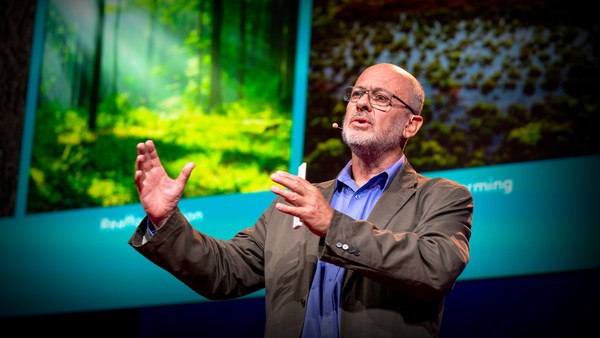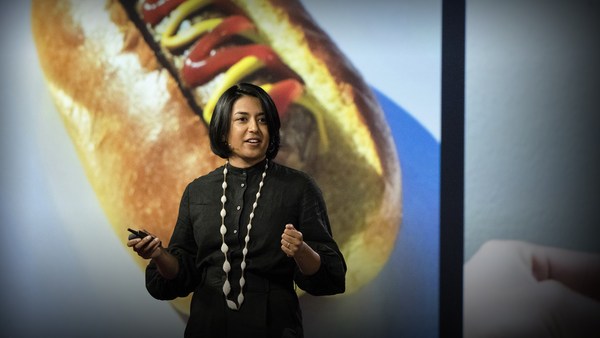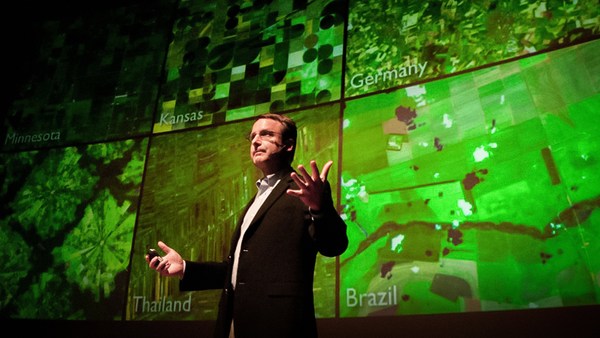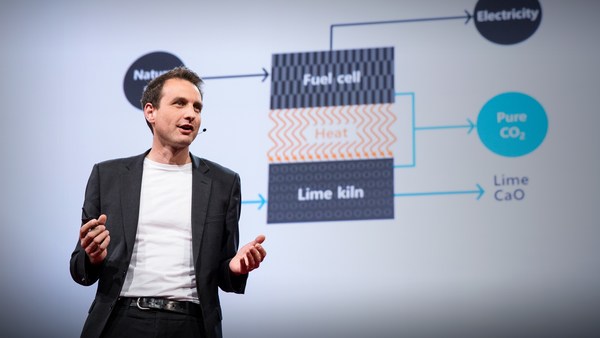Pasture is the single largest type of land on the surface of the Earth today, thanks to our taste for meat and dairy. Just over a quarter of all land is used for livestock. That's more than forests or farm fields or anything else. Most of that land is best for ruminants, such as cows, that can digest high-fiber feed such as grass and straw. However, the process by which grass and fiber is broken up in the stomachs of cows and other grazing ruminants has a byproduct, methane, a potent greenhouse gas. Despite what you might have heard about methane and cows, most of the methane is actually burped out, not through the back end.
(Laughter)
And that represents about two billion tons of carbon dioxide equivalent per year, or more than four percent of our annual global greenhouse gas emissions. We have a methane problem from cows.
So how can you reduce these methane burps? My colleagues and I may have found a solution. Seaweed! Let me explain. A couple of years ago, an article was published by Rob Kinley and colleagues that showed almost complete elimination of methane when seaweed was added to chopped grass in the lab. Great. But as an agricultural researcher, I know lots of additives work well in the lab, but not in real animals. But there was something different about seaweed and the way in which it reduced methane. So we thought we should test this in live animals. In collaboration with Joan Salwen, an entrepreneur, and colleagues from James Cook University and CSIRO, we decided to conduct a small experiment to determine the amount of seaweed we might need to use. This was the first ever experiment in dairy cattle, and we had no idea how much to give them. So we started with about 60 grams per day, going up to 250 grams. Mind you, this was mixed in with 25 kilograms of their feed. One of the graduate students I work with, Breanna Roque, trapped their methane burps.
(Laughter)
In that first experiment, the emissions were reduced by up to 67 percent.
(Applause)
And I thought at first, the equipment must have malfunctioned, but it was real.
But we are left with more questions than answers. Would the microbes in the gut get used to it and start producing methane over time? Would the seaweed be stable over a long period of time in storage? Would the taste be affected and the cows turn up their noses? Or would the seaweed affect the cows's health or milk production?
So we teamed up again to conduct another trial. Over a five-month period, we saw the seaweed that was harvested three years prior reduce emissions by over 80 percent.
(Applause)
Our colleagues in Australia, they saw up to 98 percent reduction in a similar trial. That kind of reduction is simply staggering. And in the graph, you see methane emissions in three levels of intake. So the first line is for cattle with no seaweed, The second line is for cows that were supplemented with about 30 to 40 grams of seaweed. And the last one is for cows supplemented with about 60 to 80 grams of seaweed. As you can see, as you increase the amount of seaweed, you see a reduction in methane emissions.
We have also seen an improvement in bulking up of the beef cattle with no adverse health effects. So it’s a win for the environment; it's a win for the farmers and consumers. A panel of 112 people got to taste steak made from steers offered seaweed and control. And they did not detect any difference. We also did a nutritional quality of the meat, and we found no difference between animals that were offered seaweed and the control.
So how does it work? Some seaweeds contain ingredients that directly inhibit microbes in the cow’s gut from forming methane without interfering with food digestion. The amount of methane produced is dependent on how much the animal is eating and what's in the diet. And as such, previous efforts to reduce methane emissions focused on changing their diets or improving forage quality. And we do have potential solutions other than seaweed to reduce methane emissions. We looked at additives to feed, such as 3-NOPs, reduce emissions by about 30 percent. Even garlic and citrus extract can reduce methane burps by over 20 percent without affecting animal health and productivity.
Now you may ask: Why not stop eating beef and drinking milk?
Audience member: Yeah!
(Laughter)
EK: That would be a good question. So adopting a plant-based diet with supplements may help shrink a person's carbon footprint in high-income countries like the US. But, you know, a lot of people are not going to do that. And for the rest of the world, these foods are needed to provide key nutrients, such as vitamin B12 and vitamin A, which are critical for brain function, for vision and immunity. These are found almost exclusively in beef and milk. In this graph, you see different countries with their annual meat consumption per capita on the bar graph, and then you see the dots representing the stunting rate in children below the age of five years old. And countries that have lower consumption of methane are associated with higher incidence of stunting.
I know this firsthand. Growing up in Eritrea, I loved milk and meat when you could get it, which wasn't often. Even as a kid, I always wondered how a cow, eating just grass, produces nutritious milk I love to drink. And that wonder pushed me into a career to understand and improve livestock production so that people in low-income countries do not suffer with stunting and other nutrient-deficiency diseases.
(Applause)
So what now? We know seaweed can work. But the cultivation of the specific seaweed has been a barrier. It's not so easy to farm asparagopsis taxiformis. But there are a number of efforts going on at the moment to scale up production. Blue Ocean Barns is growing seaweed in Hawaii already, and they estimate that there will be enough production to feed all cattle in the US by 2030. All we need now is for governments to step up and facilitate the use of these methane-busting feed additives. Cattle industries in some countries have already committed to climate neutrality by 2050. But if we can get these feed-additive innovations into cow stomachs earlier, we can cut methane burps significantly. Given that methane only lasts in the atmosphere for a decade or so, we could even slow global warming in the short term.
Yes, we have a methane problem from cows, but we may have seaweed and other solutions for these methane burps, helping us provide meat and dairy while maintaining a safe climate.
Thank you.
(Applause)





